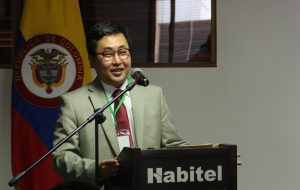 On November 28 – December 01, the second Annual Seminar on Forest Coverage Monitoring in Colombia was held in Bogotá, Colombia. This event was supported and funded by the Global Green Growth Institute (GGGI), UNREDD and the Amazon Vision program, among others. The event had the participation of national and international experts, besides having a training agenda on tools for forest monitoring in the country.
On November 28 – December 01, the second Annual Seminar on Forest Coverage Monitoring in Colombia was held in Bogotá, Colombia. This event was supported and funded by the Global Green Growth Institute (GGGI), UNREDD and the Amazon Vision program, among others. The event had the participation of national and international experts, besides having a training agenda on tools for forest monitoring in the country.
The objective of the event was to foster a space for knowledge and experience sharing that bring together top national and international experts to discuss and devise ways in which national monitoring schemes can be strengthened and better contribute to decision-making processes in light of Colombia’s commitments on climate change, sustainable development, reduced deforestation and ecosystems´restoration.
The event was attended by Chanho Park, Head of Programs Large Emerging Economies of GGGI, who highlighted the need to involve Monitoring, Reporting and Verification – MRV not just as an international requirement but as a process with a clear objective for the continuous improvement in forest management. He also highlighted the principle of transparency as essential in any endeavor of an MRV system.
Thelma Krug, Head of the International Affairs Office at the National Institute for Space – Brazil, and IPCC member, noted the importance of forests in climate regulation, the lack of knowledge about their dynamics and the resilience of these ecosystems. She remarked on the importance of having this kind of events to foster knowledge and experience sharing on MRV as a tool to move forward both in the technical and political Climate Change agenda.
The seminar included panels on the perspectives of deforestation in Colombia and the challenges faced by the institutional framework to face this problem in the post-conflict context. Emphasis was placed on the need to generate concrete actions and the conjunction of public and media opinion on deforestation in the country in order to give meaning and use to the forest monitoring process in Colombia.
In the event, attendees had the opportunity to train in the use of information from the Colombian Forest and Carbon Monitoring System (SMBYC), the National Forest Inventory, carbon monitoring and causes and agents of deforestation, big data management, community-based monitoring among others.
From the discussions, was clear that forests monitoring is one of the fundamental pillars for the fight against deforestation, since it contributes to the understanding of the dynamics that affect the forest cover and allows the identification of measures for their control, including early detection for enhanced fiscalization of deforestation activity. MRV can support also the participation of the private sector and interested stakeholders committed to zero deforestation objectives. This is the case with the Colombian Public- Private alliance for zero net deforestation as part of the tropical Forest Alliance 2020, also launched during the event.
“The TFA2020 Colombia Alliance that we launched today will be a platform to join forces in favor of sustainable production without deforestation. The best way to control this phenomenon is through the creation of productive systems that allow the agricultural frontier not to advance to strategic ecosystems. This alliance is very important for the country because it allows attracting technical assistance, financial resources, knowledge, access to new markets and maintain competitiveness, “said Minister of Environment and Sustainable Development, Luis Gilberto Murillo.
Efforts like this one showed crossing paths between technical MRV information, sectoral market differentiation interests, forest conservation and political will that can arise at events as this successful second Annual Seminar on Forest Coverage Monitoring in Colombia.